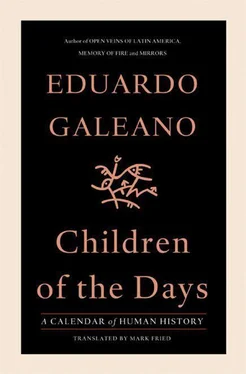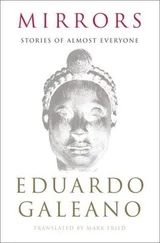But many more, over a much longer period, were stolen by Australia’s democracy, with consent from the law and applause from the public.
In the year 2008, Australian Prime Minister Kevin Rudd apologized to the aboriginal communities that had been stripped of their sons and daughters for more than a century.
State agencies and Christian churches had kidnapped the children and placed them with white families to save them from poverty and crime, and to civilize them and distance them from savage customs.
“To whiten the race,” people used to say.
February 15. MORE STOLEN CHILDREN
“Marxism is the worst form of mental illness,” ruled Colonel Antonio Vallejo Nájera, psychiatrist supreme in Generalissimo Francisco Franco’s Spain.
He had studied Republican mothers in prison and proven that they harbored “criminal tendencies.”
To defend the purity of the Iberian race, threatened by Marxist degeneration and maternal delinquency, thousands of newborns and infants, children of Republican parents, were kidnapped and plopped into the arms of families devoted to the cross and sword.
Who were those children? Who are they, so many years later?
No one knows.
Franco’s dictatorship falsified the records to cover its tracks and ordered everyone to forget: it stole the children and it stole their memory.
February 16. THE CONDOR PLAN
Macarena Gelman was one of the many victims of Operation Condor, the common market of terror that linked South America’s dictatorships.
Macarena’s mother was pregnant with her when the Argentine generals sent her to Uruguay. The Uruguayan dictatorship oversaw the birth, killed the mother and handed the newborn daughter to a police chief.
Throughout her childhood Macarena was tormented by the same inexplicable nightmare: she was being chased by several men armed to the teeth, and night after night she would wake up crying.
The nightmare stopped being a mystery when Macarena discovered the true story of her life. That was when she realized she had been dreaming her mother’s real panic: while Macarena was taking shape in the womb, her mother was fleeing the military witch hunt that caught up with her in the end and sent her to her death.
February 17. THE CELEBRATION THAT WAS NOT
The peons on the farms of Argentina’s Patagonia went out on strike against stunted wages and overgrown workdays, and the army took charge of restoring order.
Executions are grueling. On this night in 1922, soldiers exhausted from so much killing went to the bordello at the port of San Julián for their well-deserved reward.
But the five women who worked there closed the door in their faces and chased them away, screaming, “You murderers! Murderers, get out of here!”
Osvaldo Bayer recorded their names. They were Consuelo García, Ángela Fortunato, Amalia Rodríguez, María Juliache and Maud Foster.
The whores. The virtuous.
February 18. BEREFT OF HIM
When Michelangelo learned of the death of Francesco, who was his apprentice and much more, he took a hammer and smashed the marble he was sculpting.
A short while later, he wrote that such a death:
. had been God’s will, but it caused me grave harm and infinite pain. The saving grace lies in the fact that Francesco, who in life kept me alive, by dying taught me to die without sorrow. I had him for twenty-six years. Now only infinite misery remains. Most of me went with him.
Michelangelo lies buried in Florence, in the church of Santa Croce.
He and his inseparable Francesco used to sit on the steps of the church to enjoy, in the vast plaza below, the duels fought with kicks and blasts of the ball that we now call soccer.
February 19. PERHAPS THIS IS HOW HORACIO QUIROGA WOULD HAVE WRITTEN ABOUT HIS OWN DEATH
Today I died.
In the year 1937 I learned that I had a cancer that was untreatable.
I knew that death, after me always, had caught up with me.
I confronted death, face to face, and I told him: “This war is over.”
I said: “You win.”
I said: “But when is my choice.”
And before death killed me, I killed myself.
February 20. WORLD DAY OF SOCIAL JUSTICE
At the end of the nineteenth century, Juan Pío Acosta lived near Uruguay’s border with Brazil.
In those lonely parts, his work kept him on the road, moving from town to town.
He traveled by stagecoach, along with eight other passengers in first, second and third class.
Juan Pío always bought a third-class ticket, which was the least expensive.
He never understood why there were different prices. Everyone had the same seats, whether they paid more or paid less: jammed in, eating dust, jolted relentlessly.
He never understood why until one bad winter day, when the wagon got stuck in the mud. The coachman ordered:
“First-class, stay where you are!”
“Second-class, get off!”
“And those in third. start pushing!”
February 21. THE WORLD SHRINKS
Today is International Mother Language Day.
Every two weeks, a language dies.
The world is diminished when it loses its human sayings, just as when it loses its diversity of plants and beasts.
In 1974 Angela Loij died. She was one of the last Ona Indians from Tierra del Fuego, way out there at the edge of the world. She was the last one who spoke their language.
Angela sang to herself, for no one else, in that language no longer recalled by anyone but her:
I’m walking in the steps
of those who have gone .
Lost, am I .
In times gone by, the Onas worshipped several gods. Their supreme god was named Pemaulk.
Pemaulk meant “word.”
In Istanbul, known in those days as Constantinople, Paul the Silentiary finished his fifteen love poems in the year 563.
The Greek poet owed his name to his work. He was in charge of silence in the palace of Emperor Justinian.
In his own bed, too.
One of his poems says:
Your breasts against my breast ,
your lips on my lips .
Silence is the rest:
Tongues that never pause I detest .
February 23. THE BOOK OF MARVELS
One day like this in 1455, Europe’s first book printed with moveable type came off the press and it was a Bible.
The Chinese had been printing books for two centuries, but today Johannes Gutenberg initiated the mass circulation of the most gripping novel in literature.
Novels tell but don’t explain, and there is no reason why they should. The Bible does not say what Noah ate to reach the age of seven hundred by the time of the Flood, nor what method Abraham’s wife used to become pregnant at ninety, nor does it clarify whether Balaam’s ass, when arguing with its owner, spoke in Hebrew.
February 24. A LESSON IN REALISM
In 1815 Napoleon Bonaparte escaped from his prison on the island of Elba and set off to regain the French throne.
On he marched, accompanied by a steadily growing army, while his former official organ, Le Moniteur Universel , swore that the people of France were eager to die to protect King Louis XVIII. The paper said Napoleon had “sullied and raped the soil of the fatherland,” called him “foreign outlaw, usurper, traitor, plague, bandit chief, enemy of France who dares befoul the land from which he was expelled,” and announced: “This will be his final act of insanity.”
In the end the king fled, no one died for him, and Napoleon took his seat on the throne without firing a shot.
Читать дальше












